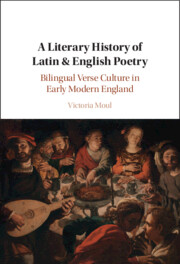Book contents
- A Literary History of Latin & English Poetry
- A Literary History of Latin & English Poetry
- Copyright page
- Dedication
- Contents
- Figures
- Acknowledgements
- Abbreviations
- Introduction
- Part I Shorter Verse
- Chapter 1 Anglo-Latin ‘Moralizing Lyric’ in Early Modern England
- Chapter 2 Metrical Variety and the Development of Latin Lyric Poetry in the Latter Sixteenth Century
- Chapter 3 Buchanan, Beza and the Genre of the Sidney Psalter
- Chapter 4 Formal Panegyric Lyric in England, 1550–1650
- Chapter 5 Abraham Cowley and Formal Innovation
- Chapter 6 Religious and Devotional Epigram and Lyric
- Chapter 7 Epigram Culture and Literary Bilingualism in Early Modern England
- Chapter 8 Satire, Invective and Humorous Verse
- Part II Longer Verse
- Afterword
- Metrical Appendix: Latin Metres
- Bibliography A: Manuscripts
- Bibliography B: Early Printed Books
- Bibliography C: Secondary Literature
- Index
Chapter 6 - Religious and Devotional Epigram and Lyric
from Part I - Shorter Verse
Published online by Cambridge University Press: 23 June 2022
- A Literary History of Latin & English Poetry
- A Literary History of Latin & English Poetry
- Copyright page
- Dedication
- Contents
- Figures
- Acknowledgements
- Abbreviations
- Introduction
- Part I Shorter Verse
- Chapter 1 Anglo-Latin ‘Moralizing Lyric’ in Early Modern England
- Chapter 2 Metrical Variety and the Development of Latin Lyric Poetry in the Latter Sixteenth Century
- Chapter 3 Buchanan, Beza and the Genre of the Sidney Psalter
- Chapter 4 Formal Panegyric Lyric in England, 1550–1650
- Chapter 5 Abraham Cowley and Formal Innovation
- Chapter 6 Religious and Devotional Epigram and Lyric
- Chapter 7 Epigram Culture and Literary Bilingualism in Early Modern England
- Chapter 8 Satire, Invective and Humorous Verse
- Part II Longer Verse
- Afterword
- Metrical Appendix: Latin Metres
- Bibliography A: Manuscripts
- Bibliography B: Early Printed Books
- Bibliography C: Secondary Literature
- Index
Summary
Seventeenth-century English poetry is renowned for its religious lyric, especially that of Herbert, Donne, Crashaw, Vaughan and Traherne. In Chapters 2 and 3 we saw how the interest in metrical and formal variety, which is such a marked feature of Herbert’s 'Temple' (1633), can be traced back to the Latin poetic experiments and innovations of the latter sixteenth century, and specifically to the technical and tonal variety of the most influential of the psalm paraphrase collections. This chapter deals in large part with another of the influences upon Herbert’s distinctive style – namely the largely (though not exclusively) Jesuit poetics of Latin devotional verse, which combined with the tradition of formal variety, scriptural paraphrase and religious epigram to revolutionary effect in seventeenth-century England. It traces the development of religious verse in England from the mid-sixteenth through to the early eighteenth century, and describes how the new kind of devotional lyric was read and written alongside older types of religious verse, especially scriptural and devotional epigram and paraphrase.
Keywords
- Type
- Chapter
- Information
- A Literary History of Latin & English PoetryBilingual Verse Culture in Early Modern England, pp. 223 - 270Publisher: Cambridge University PressPrint publication year: 2022

